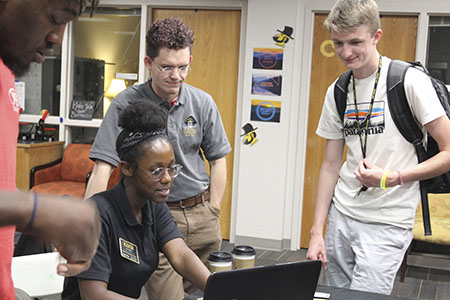Plemmons Student Union Learning Outcomes

Because of a student’s employment in the Plemmons Student Union and Legends, they will:
- Feel connected to Appalachian by providing an integral service to the campus community.
- Develop a sense of teamwork with a group of fellow students and staff working towards a similar goal.
- Develop decision making and conflict resolution skills through their work with the campus community.
- Learn time management skills and develop a strong work ethic through balancing work and academic responsibilities.
- Understand their unique role in the student union and Legends as a process of empowerment, development, and growth; rather than just a job.
National Association of Colleges and Employers (NACE)
The career readiness of college graduates is an important issue in higher education, in the labor market, and in the public arena. Yet, up until now, "career readiness" has been undefined, making it difficult for leaders in higher education, work force development, and public policy to work together effectively to ensure the career readiness of today's graduates.
The National Association of Colleges and Employers (NACE), through a task force of college career services and HR/staffing professionals, has developed a definition, based on extensive research among employers, and identified eight competencies associated with career readiness.
Career Readiness Definition and Competencies
Career Readiness is defined by NACE as the attainment and demonstration of requisite competencies that broadly prepare college graduates for a successful transition into the workplace.
NACE has identified the following competencies:
- Critical Thinking/Problem Solving: Exercise sound reasoning to analyze issues, make decisions, and overcome problems. The individual is able to obtain, interpret, and use knowledge, facts, and data in this process, and may demonstrate originality and inventiveness.
- Oral/Written Communications: Articulate thoughts and ideas clearly and effectively in written and oral forms to persons inside and outside of the organization. The individual has public speaking skills; is able to express ideas to others; and can write/edit memos, letters, and complex technical reports clearly and effectively.
- Teamwork/Collaboration: Build collaborative relationships with colleagues and customers representing diverse cultures, races, ages, genders, religions, lifestyles, and viewpoints. The individual is able to work within a team structure, and can negotiate and manage conflict.
- Digital Technology: Leverage existing digital technologies ethically and efficiently to solve problems, complete tasks, and accomplish goals. The individual demonstrates effective adaptability to new and emerging technologies.
- Leadership: Leverage the strengths of others to achieve common goals, and use interpersonal skills to coach and develop others. The individual is able to assess and manage his/her emotions and those of others; use empathetic skills to guide and motivate; and organize, prioritize, and delegate work.
- Professionalism/Work Ethic: Demonstrate personal accountability and effective work habits, e.g., punctuality, working productively with others, and time workload management, and understand the impact of non-verbal communication on professional work image. The individual demonstrates integrity and ethical behavior, acts responsibly with the interests of the larger community in mind, and is able to learn from his/her mistakes.
- Career Management: Identify and articulate one's skills, strengths, knowledge, and experiences relevant to the position desired and career goals, and identify areas necessary for professional growth. The individual is able to navigate and explore job options, understands and can take the steps necessary to pursue opportunities, and understands how to self-advocate for opportunities in the workplace.
- Global/Intercultural Fluency: Value, respect, and learn from diverse cultures, races, ages, genders, sexual orientations, and religions. The individual demonstrates, openness, inclusiveness, sensitivity, and the ability to interact respectfully with all people and understand individuals’ differences.
Why do we use the NACE compentencies?
The Plemmons Student Union values the deveolpment of our student employees and we have incorporated the NACE competencies in order to better prepare students for their next step after graduation. Below is a chart that represents Employer vs. Student Perception of Proficiency in Career Readiness Compentencies. This chart supports our mission to develop students in important compentencies in order to increase their success in their position and after graduation.
| Competency | % of Employers that Rated Recent Grads Proficient* | % of Students Who Considered Themselves Proficient** |
|---|---|---|
| Professionalism / Work Ethic | 42.5% | 89.4% |
| Oral / Written Communications | 41.6% | 79.4% |
| Critical Thinking / Problem Solving | 55.8% | 79.9% |
| Teamwork / Collaboration | 77.0% | 85.1% |
| Leadership | 33.0% | 70.5% |
| Digital Technology | 65.8% | 59.9% |
| Career Management | 17.3% | 40.9% |
| Global / Intercultural Fluency | 20.7% | 34.9% |
Source: Job Outlook 2018 (N=201 employing organizations) and The Class of 2017 Student Survey Report (N=4,213 graduating seniors), National Association of Colleges and Employers
*The percentages corresponding to "rated proficient" represent, among all responding employers, the percentage who, on a 5-point scale, rated recent graduates either "very" (4) or "extremely" (5) proficient in the respective competency.
**The percentages corresponding to "considered proficient" represent, among all responding graduating seniors from the Class of 2017, the percentage who, on a 5-point scale, considered himself/herself either "very" (4) or "extremely" (5) proficient in the respective competency.